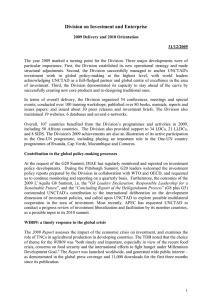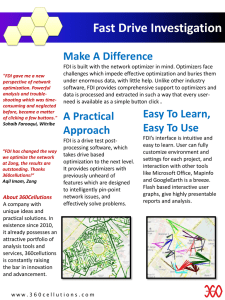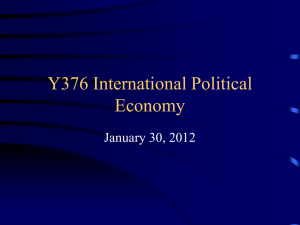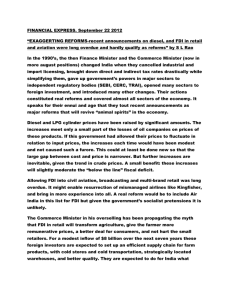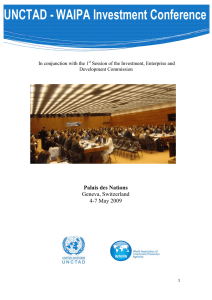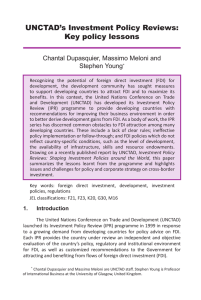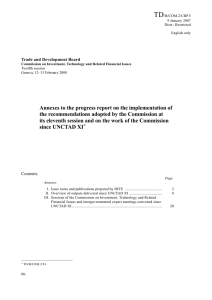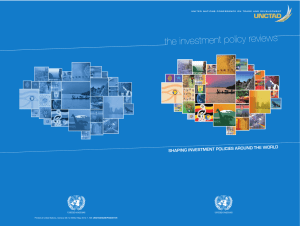Division on Investment and Enterprise
advertisement
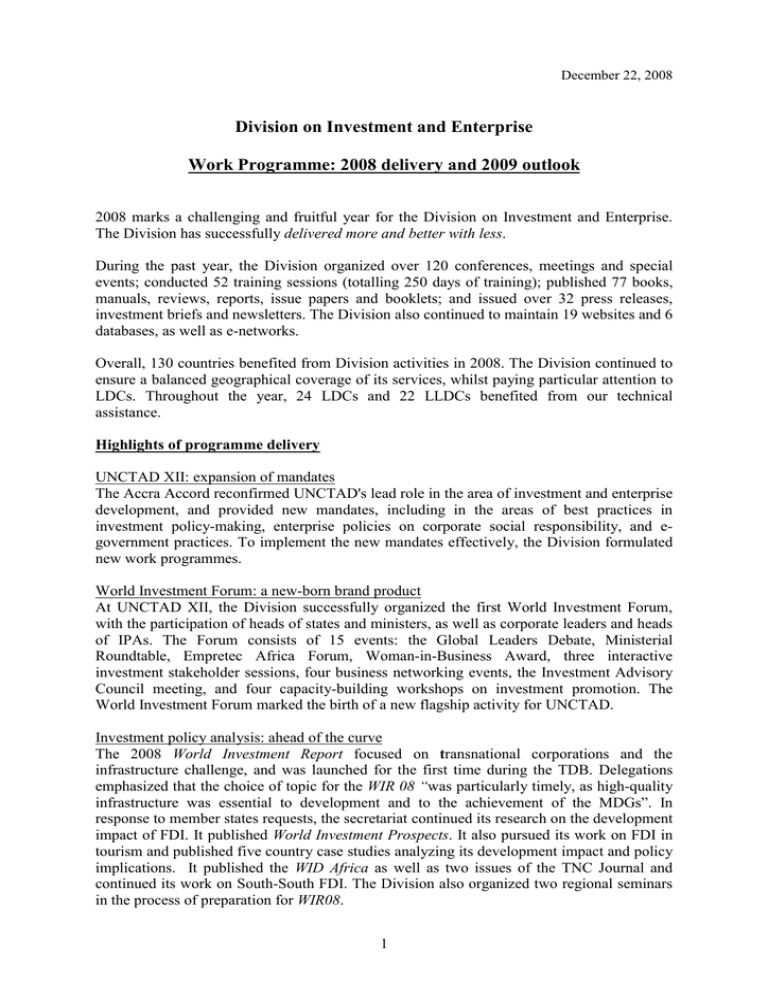
December 22, 2008 Division on Investment and Enterprise Work Programme: 2008 delivery and 2009 outlook 2008 marks a challenging and fruitful year for the Division on Investment and Enterprise. The Division has successfully delivered more and better with less. During the past year, the Division organized over 120 conferences, meetings and special events; conducted 52 training sessions (totalling 250 days of training); published 77 books, manuals, reviews, reports, issue papers and booklets; and issued over 32 press releases, investment briefs and newsletters. The Division also continued to maintain 19 websites and 6 databases, as well as e-networks. Overall, 130 countries benefited from Division activities in 2008. The Division continued to ensure a balanced geographical coverage of its services, whilst paying particular attention to LDCs. Throughout the year, 24 LDCs and 22 LLDCs benefited from our technical assistance. Highlights of programme delivery UNCTAD XII: expansion of mandates The Accra Accord reconfirmed UNCTAD's lead role in the area of investment and enterprise development, and provided new mandates, including in the areas of best practices in investment policy-making, enterprise policies on corporate social responsibility, and egovernment practices. To implement the new mandates effectively, the Division formulated new work programmes. World Investment Forum: a new-born brand product At UNCTAD XII, the Division successfully organized the first World Investment Forum, with the participation of heads of states and ministers, as well as corporate leaders and heads of IPAs. The Forum consists of 15 events: the Global Leaders Debate, Ministerial Roundtable, Empretec Africa Forum, Woman-in-Business Award, three interactive investment stakeholder sessions, four business networking events, the Investment Advisory Council meeting, and four capacity-building workshops on investment promotion. The World Investment Forum marked the birth of a new flagship activity for UNCTAD. Investment policy analysis: ahead of the curve The 2008 World Investment Report focused on transnational corporations and the infrastructure challenge, and was launched for the first time during the TDB. Delegations emphasized that the choice of topic for the WIR 08 “was particularly timely, as high-quality infrastructure was essential to development and to the achievement of the MDGs”. In response to member states requests, the secretariat continued its research on the development impact of FDI. It published World Investment Prospects. It also pursued its work on FDI in tourism and published five country case studies analyzing its development impact and policy implications. It published the WID Africa as well as two issues of the TNC Journal and continued its work on South-South FDI. The Division also organized two regional seminars in the process of preparation for WIR08. 1 FDI statistics: the backbone of informed policy making The Division continued to maintain its online FDI statistics, which contains profiles for 142 countries, fact sheets for 187, and FDI in brief datasheets for 78. It intensified technical assistance to build institutional capacities for the collection and compilation of statistics on FDI and TNCs, and to strengthen regional cooperation in harmonizing data through a series of national and regional workshops. Overall seven countries and two regional groupings have benefited from the training in FDI statistics. For COMESA, the Division is preparing a common statistical methodology and survey. IPRs and follow-up: an effective package of policy assistance In 2008, four new Investment Policy Reviews (IPRs) were finalized: the Dominican Republic, Mauritania, Nigeria and Viet Nam, and another four (Belarus, Burkina Faso, Burundi and Sierra Leone) are being prepared. The total of completed IPRs now amounts to 24, 9 of which are LDCs. The Reports were considered at the level of head of states and cabinet minsters. For example, the President of Nigeria and his cabinet ministers met with the UNCTAD delegation headed by the Secretary-General to discuss the implementation of the IPR recommendations. Several countries availed themselves to the package of policy assistance enshrined in their IPRs. This IPR follow-up covered activities including skills attraction (Rwanda), i-portals (Ghana, Benin and Laos), the development of investment laws and BIT models (Ghana), the codification of investment related laws (Morocco), national regulatory reforms (Colombia) and investment promotion and facilitation activities (Ethiopia and Zambia). Work in this area also includes the preparation of a Bluebook for Nigeria. Intellectual Property Rights: successful partnership The Division prepared a Reference Guide for Intellectual Property Rights and Access to Medicines. It continued its full partnership with ICTSD in policy analysis and stakeholder dialogues. It also established extensive collaboration with WIPO in implementing the “Development Agenda”, and with WHO in implementing the “Plan of Action on Building Capacity on Access to Medicines” at the request of the two organizations. IIAs: focal point for the international investment system The Division continued to provide backstopping to the international investment system. Activities in 2008 covered research and policy analysis (with seven new studies for the IIA series and the IIA Monitor), and information services (with expanded databases on investment treaties and investor-State dispute settlement cases). In technical assistance, 11 regional and national intensive training courses, and 12 ad hoc advisory services and special events were delivered. Overall, some 94 countries benefited from the 87 days of training delivered by the IIA programme. Best practices: a new policy tool In response to the Declaration of the 2007 G8 Summit and the subsequent new mandate received in Accra, a new work programme on best practices in investment policy-making was launched. This involved international dialogue through our high-level participation (and facilitation of LDC participation) in the OECD-UNCTAD Global Investment Forum and the Ministerial Roundtable at UNCTAD XII. It also involves 20+ case studies of successful FDI policies of high development relevance, such as "Attracting FDI to small economies," "Using FDI to build in peace in post conflict countries," "Using FDI to build infrastructure: The case of roads," and "Using FDI to build infrastructure: The case of electricity". The study series will form the basis of tailor-made technical assistance toolkit aimed at creating conducive environments in developing countries to attract and benefit from FDI. 2 Investment facilitation: attracting investment The Division launched a new investment advisory series – toolkits for investment promotion practitioners. Three issues were published (Investment Policy Advocates, Investors Aftercare, and Evaluating Investment Promotion Agencies) and another three are in the pipeline. A high-level Investment Forum on "Investing in landlocked developing countries" was organized during the General Assembly’s high-level review of the Almaty Programme of Action. Advisory services on investor targeting strategies, IPA client charters, policy advocacy strategies and institutional support were provided to 8 countries. 14 national, regional and interregional workshops were organized. Overall, the Division’s investment facilitation work has helped over 300 investment promotion officials and policy makers from 65 countries. ISAR: a new height marked by its 25th anniversary The 25th IGE on ISAR was attended by a record 325 experts, including several ministers. During the high-level segment, the role of international accounting and reporting standards and codes in promoting financial stability was discussed against the background of the financial crisis. The meeting reviewed practical implementation issues of the International Financial Reporting Standards, including the Accounting and Financial Reporting Guidelines for Small and Medium-sized Enterprises (SMEGA), capacity-building in corporate accounting and reporting, and non-financial reporting in the areas of corporate governance and corporate responsibility. It was complemented by two technical workshops on public sector accounting standards and on environmental, social and governance disclosure. Enterprise development: two new initiatives Two new initiatives were successfully launched in 2008. The Women in Business Awards raised the profile of women entrepreneurs' contribution to economic development. The Empretec Africa Forum was recognized for its practical and concrete contribution to SMEs development. The annual Empretec Directors' Meeting held in Sao Paulo in November was attended by Empretec directors from 22 countries. They discussed Empretec activities, plans for expansion of training, and considered new strategic directions for the programme. CSR: responsible investment A study was completed shedding light on voluntary enterprise policies on environmental, social and governance issues among 40 large enterprises in 10 large emerging markets. In addition, a workshop was organised on the Policy Context for Responsible Investment. The Division continued to provide substantive support to the ISO Working Group on Social Responsibility, the ICC Committee on CSR, and the OECD Roundtable on CSR, as well as a number of civil society and academic institutions. E-regulations: facilitating business The e-regulations system now operates in nine countries. It presents the administrative procedures related to enterprise creation and operations, indicating requirements, costs and duration, and providing online access to forms, civil servants contact data and complaint channels. E-tourism and insurance: new synergy The Division also integrated the e-tourism work (redeployed from DTL) into its enterprise work in response to the Secretary-General’s decision, and completed a new training package on e-business solutions in tourism of developing countries. Efforts were also made to enhance the capacity of the insurance programme of the Division. 3 Managerial orientation Building on the Secretary-General’s vision of “One-UNCTAD”, the Division has implemented his “3C Principles” (Coordination, Communication, and Concentration) in its programme delivery. An integrated management mechanism was put in place in 2008 to better coordinate the Division's work. A "DIAE Common Staff Work Plan" was created and shared with all its staff members. This common work plan – that is being updated regularly – reflects the assignments and focal points, provides indication of the schedule and status of delivery of the outputs, as well as sources of funding. A new "Performance Appraisal System" was also established to facilitate in-depth assessment of the relevance, quality, efficiency, effectiveness and impact of Division's outputs. This tool was well received by member States. The Division also continued its efforts to develop and strengthen its cooperation and coordination within UNCTAD and with other organizations. The Division actively contributed to the Secretary-General’s vision of “One-UNCTAD”, through intensified cooperation with other Divisions and Programmes (such as with the LDC Division and the UN-OHRLLC in the preparation of the High-level Investment Forum for LLDCs, and with the Commodities Programme in the preparation of the 12th African Oil, Gas and Minerals Trade and Investment Conference), active participation in the Secretary-General’s task forces on key emerging issues and contribution to central functions. The Division also made every effort to collaborate with the Technical Cooperation Service to submit proposals in the context of the "One UN programme" as well as in the new UNDAFs (covering over 20 countries). Co-operation also continued with other partners, including with ICC, ICTSD, ITC, OECD, UN Global Compact, WAIPA, WIPO, World Bank Group and WHO. Throughout the year, the Division continued to improve its communication, dissemination and marketing methods for its publications and project outputs, with the support of the Office of the Secretary-General and Communication, Information and Outreach Services. The dissemination of WIR and other research outputs through national and regional policy seminars (sometimes in collaboration with academia and regional organizations) was particularly effective. In addition, several brochures were prepared to better inform policy makers about its activities. Furthermore, a number of publications (such as the WID) are now published on CD-ROMs to allow for regular update. The Division’s electronic network of experts and various investment databases were further expanded, and new features were added. It is worth mentioning that the timely email routing of scanned copies of communications via OSG has increased significantly the efficiency at the Divisional level in responding to the external requests and in information sharing among branch and section chiefs, and the staff concerned. The Division made an effort to concentrate its work programme delivery around its flagship projects/products and improve their delivery through better integration and crossfertilization. At the same time, the Division improved its flagship delivery through several new products. The Division consolidated its publications by grouping them into thematicoriented and reader-targeted study series (such as the Investment Advisory Series), thereby reducing the total number of publications. The Division also consolidated its various technical assistance projects in line with the thematic clusters of UNCTAD (from over 70 projects into four clusters, each consisting of a few multi-year and multi-donor projects). The better integration between products and projects resulted in a substantial increase in the number of countries that benefited from the full range of the Division's advisory services. 4 Challenges ahead 2009 will be another challenging year for the Division. We will continue to work towards the Secretary-General’s vision of working within a “One-UN” and a “One-UNCTAD”, whilst implementing his “3C Principles” in our programme delivery. In the first half of 2009, we will commence the preparations for the second World Investment Forum and prepare for the High-Level meeting on public investment in Brazil in April 2009 (President Lula’s initiative). We will also prepare the first session of the newly established Commission on Investment, Enterprise and Development, which will be synergized with the annual WAIPA conference. The Division will implement two multi-year expert meetings (on "enterprise development policies", and on "investment for development”), and provide substantive inputs to a third multi-year expert-meeting (on “South-South cooperation”). The Division will also organize the intergovernmental review of four IPRs. The SecretaryGeneral has already invited the Prime Minister of Viet Nam and the President of Nigeria for these events. (Four other IPRs are in the pipeline, and another 23 countries have requested an IPR.) Preparations for the 2009 WIR are already underway, and two regional seminars are planned for the coming months. The Division will monitor closely the developments of the global financial crisis and update its assessment of the impact on investment. In the area of enterprise development, the Division is planning to organize an ad hoc stakeholders' meeting to discuss prudential regulatory frameworks, the establishment of competitive insurance markets and human resources development. As requested by ISAR, the Division will also organize a meeting to discuss the implications of the credit crisis for corporate financial reporting. The Division will organize a session of the Empretec Africa Forum in the first half of 2009. As member States struggle to cope with the impact of the global financial and economic crisis, calls for our assistance in developing adequate policy responses in the areas of investment and enterprise are expected to increase. In the meantime, the Division will continue to be faced with resource constraints. More than ever, we will be expected to do more and better with less. 5

